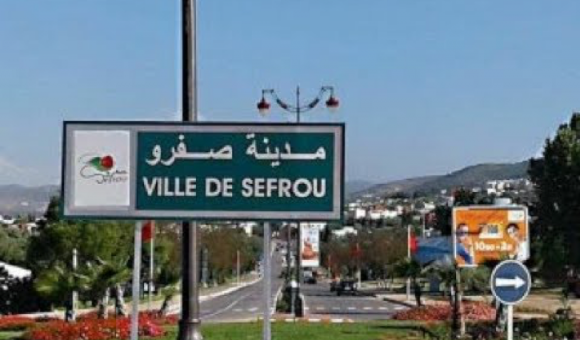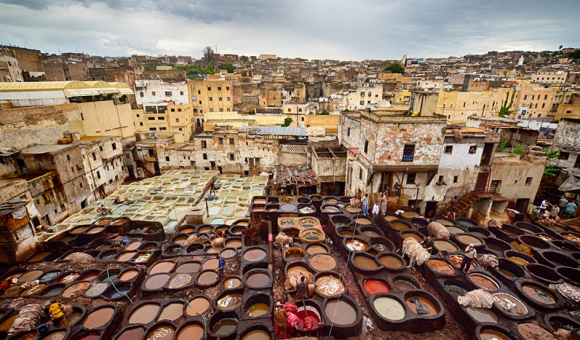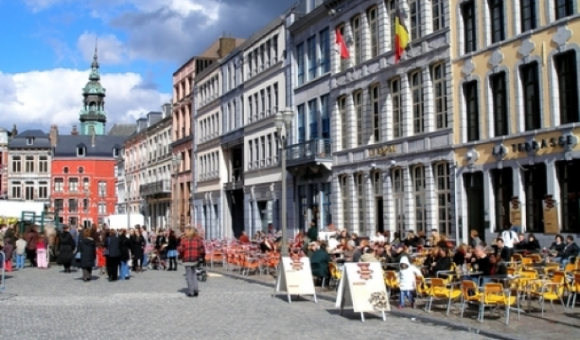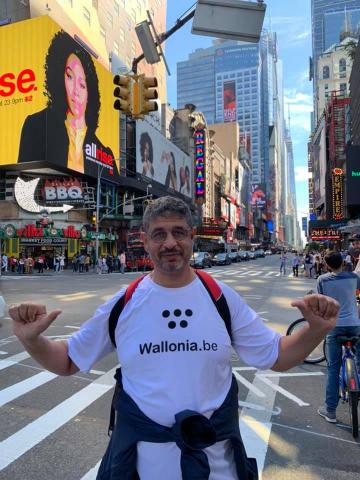WHEN MONS (Belgium - Wallonia) MET FES (Morocco)
A shared vision of development and exchange, supported by the Droit et Devoir non-profit organisation, represented by its director Eng. SAMAWI Bouchaib,
This initiative is a follow-up to the Study contract for Moroccan-Belgian Cooperation in the economic and cultural spheres, which was organised from 25 to 28/07/2018.
Context
During a Belgian-Moroccan study contract last July, a group representing actors from the public, culture, training and business sectors in Mons established contacts with their counterparts in the cities of Fez and Séfrou.
Below you can find out about the fruits of these meetings and the dialogue established, with a view to cooperation and a sustainable and beneficial co-development project for both countries, regions and sub-regions.
Given the progress of the project, and in view of the forthcoming economic mission led by H.R.H. Princess Astrid of Belgium, it seems appropriate to valorise as an example the exchanges made with our partners in Fez and Séfrou: our wish is that, if possible, they can be taken into account in the new contract, by an official meeting, either in the wonderful city of Fez, or in one of the programme days where they could be received by the members of the Belgian delegation and by the head of our delegation.
After an initial local exchange, led by young people from Hainaut, this gesture will help formalise the willingness of both the Belgian and Moroccan sides to build this fruitful and rewarding cooperation, from which the Mons-Hainaut Region can draw on new sources of influence and prosperity for its know-how, its cultural and training expertise, the quality of its university researchers and entrepreneurs.
Bouchaib Samawi,
Coordinator of the Mons-Fez/Séfrou co-development project
Preamble
As much by their respective cultural and economic roots as by their current attractiveness and development, the cities of Mons and Fez-Sefrou offer various points of convergence and opportunities for sharing.
Through their history, heritage and influence, they also provide inspiration and the exchange of mutual best practice, as well as enriching contributions from their respective cultures and activities, which can only foster discovery, dialogue and mutual understanding between a city in the North and a city in the South, whose respective role has been decisive for their countries.
The objective reasons for economic and cultural cooperation
Firstly, the historical relations between Belgium and Morocco, and in particular between Mons and the northern region of Morocco. Many Moroccan immigrants from this region came to offer their manpower to the Hainaut coalmining region in the aftermath of the Second World War.
The local will to regenerate through culture, the economic fabric of each city, and the international influence they have been able to initiate through this investment.
The rich heritage and history of each city, and the dynamism of their activities (festivals, museums, folklore, architecture)
The close association of population groups with the development projects of their city, and the expertise that offers
University-based and educational activities and renowned health infrastructures
The establishment of attractive and job-creating economic and commercial development centres
POTENTIAL PARTNERS FOR CO-DEVELOPMENT
The city of Fez
The strengths of Fez - Séfrou
Fez has made travellers dream, while inspiring countless artists and scientists, for millennia.
The university and philosophical cradle of Arab science, based around Quaraouyine University, a Mecca of knowledge and spirituality, Fez is one of the imperial capitals and a jewel of Morocco's architectural and historical heritage.
With a population of one million, it is a leading craft and cultural centre, in particular through its famous Festival of Sacred Music (*), which is internationally recognised. It is also a listed UNESCO World Heritage site. Following on from the festival (set up in 1994), the Fez Forum has been bringing together experts from all over the world since 2001 to discuss the challenges of the future, water resources, sustainable development issues, intercultural dialogues and the spread of spiritualism, etc.
(*) This festival was designated by the United Nations in 2001 as one of the main events to have made an outstanding contribution to the dialogue of civilizations. It enjoys an international network of support and media coverage, for example in the United States, where the organisation 'Spirit of Fez Inc'. organises a programme of the 'Festival and Forum of Fez' every two years, across twenty American cities.
The city of Séfrou
28 km from Fez and 73 km from Boulemane, at the foot of the Middle Atlas region, Séfrou (820 m above sea level) is a city steeped in its tribal and agricultural history.
It is crossed by a river, the Agay wadi, or Assif N'Aggay in Amazigh, a river of the group or tribe of the Ihinagens who are part of the Aït Youssi. This indigenous population ruled the Agay wadi area long before the arrival of Jews and Arabs in the 1st and 6th centuries. (ref. www.alainamiel.com). There is a waterfall within the city itself, one of many springs and waterfalls in the province.
The city is famous for its Cherry Festival or "Moussem Hab Al Moulouk" (Moussem of the fruit of kings), which takes place over three days in June and has been organised since 1920. This festival has been included by UNESCO on its list of the intangible cultural heritage of humanity since 2012.
The city of Mons
Mons is the capital of the province of HAINAUT, located in the Walloon region of Belgium. It has enriched its heritage over the centuries, always with a religious but also folklore connection, with the magnificent cathedral dedicated to Saint Waudru, founder of the monastery which foreshadowed the city. Mons has had a turbulent history due to its border position with France, and the European wars. In the 19th century, the region saw the development of industry, especially coalmining. The University of Mons was founded during this period, initially under the name 'Ecole des Mines'. This economic boom also impacted the social and political life of the country, with the emergence of Belgian workers' movements.
In 1970, the American military base SHAPE was set up near Mons. In the 1980s, Mons invested in its heritage (setting up the international film festival), and the economic regeneration of the region. The arrival of major technology companies (Microsoft) allowed the city to become the European Capital of Culture in 2015. This event made it possible to valorise the architectural sites, create new museums, and above all allowed the city's driving forces to help bring all this about. As underscored by Elio di Rupo, Mayor of Mons: "Culture brings together all of society, starting with the world of work. It infiltrates all places where people are looking for creativity, authenticity, originality, and innovation... It has become a very important economic sector."
In total, the city attracted more than 2 million visitors, and enjoyed an international reach. The spillover effect of 2015 took the form of a biennial festival bringing together various artistic disciplines, but also an economic boom bolstering new development challenges: biotechnology, the digital industry, and the green economy.
ECONOMIC AND CULTURAL CO-DEVELOPMENT
Why bring Fez and Mons closer together ?
Fez and Mons are cities that go back millennia. Both have been important religious and political centres in their civilisations. Both are listed as UNESCO World Heritage Sites and enjoy an international reputation in the cultural sphere.
Both are also important university cities, and intellectual and craft centres. As such, they attract and unite various artistic, economic and social influences, and a population that is open to the world, tolerant and blends different cultures, beliefs and origins, in mutual respect.
This shared heritage and shared values prompt us to create more points of convergence and share constructive projects, both in the area of culture and investment in the training and qualification of young people, who are the future of our two cities and regions.
Our aim is to create a common approach and cooperation that will bring the populations of Mons, European Cultural Capital, to Fez, African Cultural Capital, and vice versa.
For Mons, this is an ambitious partnership, being the first with an African city, but also because it covers multiple areas, which are all opportunities for exchange.
For Fez, the cooperation underscores the socio-cultural points of convergence (heritage, social and cultural mix) but also benefits from the experience of a comprehensive, mobilising cultural project for its population). The priority areas of collaboration are the following:
- Projects for city management: exchange of knowledge, best practice, administrative optimisation
- Projects in the areas of art and crafts: encouragement and support for VSEs/SMEs through the exchange and opening of new markets: art, local and organic products, crafts (construction and decoration)
- Projects in tourism and the environment: valorisation of museum sites, heritage protection, ecological transport, tourism training
- Project for the training and socio-professional integration of young people: new economic opportunities (eco-construction, recycling, organic and sustainable agriculture, green energy, etc.)
- Projects for art and culture: collaborations between artistic associations and productions, museum partnerships, festivals, etc.
The two cities can learn from each other in these areas and build strong and beneficial relationships, by becoming the crossroads between Europe and Africa, but also between their sub-regions in Morocco and Belgium.
Some examples of cooperation
The international reputation of the Festival of Sacred Music in Fez, for example, is an opportunity for Mons to join the international network of cities such as Milan, London and Madrid which today spread the "spirit of Fez", an extension of the festival and its message of peace and dialogue of spiritualities abroad.
The organisers plan to hold a joint exhibition focusing on crafts and local products, as well as meetings between craftsmen and producers from the Fez-Séfrou and Mons regions, in order to develop investment opportunities, exchange practices, launch new projects, and open up new commercial and employment opportunities.
At the same time, a meeting between the elected representatives of the two cities (regions) and the professional associations will be set up to present their support for development and cooperation plans on the issues facing their cities: education, environment, mobility, employment and training.
Legal framework
Regulation (EC) No 1905/2006 of the European Parliament and of the Council of 18 December 2006 establishing a financing instrument for development cooperation (IDC), stipulates in Article 25(1)(j) that: "Community financing may take the following forms [..] funding for twinning programmes between public institutions, local authorities, national public bodies or private-law entities entrusted with public service tasks of a Member State and those of a partner country or region".
The first accomplishments envisaged:
- Implementation of the "Spirit of Fez" programme, as a relay for the message of the festival and the meetings in Fez.
- Promotion of the Séfrou Cherry Festival, Moussem Hab Al Moulouk and exchanges with similar local initiatives.
- Extending the exchange to other activities, more cultural and academic, for successful integration. The two partners will identify the avenues for European subsidies.
- Training and professional integration programme to strengthen the skills of young people and ensure sustainable co-development in the area of education and training, in particular through the reception (exchange) of young people under 15 years of age for sporting and cultural activities.
- Cooperation for institutional capacity building, local schools and OFPPT (Office for vocational training and work promotion). Developing a programme of exchange of expertise in teacher training and trainers in the sectors of water, renewable energy, waste, eco-tourism, etc. (extension of Cop 22 in Marrakech).
Specific proposals for 2018-2019
(Following the Morocco-Belgium Cooperation contract, July 2018)
- Facilitate access to students from Fez, Séfrou and Oujdapour to pursue studies at Belgian universities (University of Mons and University of Fez), through information and guidance.
- Strengthen the skills and technical capacities of the staff of the University Hospital (CHU) of Fez and other hospitals in the city of Séfrou, in partnership with the University Hospital (CHU) of Mons.
- Strengthen the skills of trainees by exchanging the know-how of trainers from the Office for vocational training and work promotion and trainers for professional integration in Wallonia-Brussels through technical assistance missions and training seminars.
- Ensure the promotion of the national legal system and Morocco's international commitments in this area, the exchange with the President of the Bar of Mons.
- On the occasion of the Mons Day of Moroccan Culture organised in Mons on 18 May, invite the regional investment centre to distribute tailor-made offers to investors with a migrant background, to reassure them and encourage them to invest in high added value sectors.
- Organise a photography exhibition in Mons with the Mundaneum, the Marrakech photographic archive, on the photos of Charles Henneghien (miners from Morocco). Cooperation between the Jewish Museum and the Séfrou photographic archive.
- Organise the promotion and distribution of the film "Al Massira El KHADRA" and other films in the "Plaza Art" cinemas during the "Demain" Festival in Mons (Belgium).
- Allow artistic and musical experience to bring musicians together, invite musicians recognised in the field (Andalusian music - classical music) and organise a concert during the Hainaut festival in conjunction with the city of Tournai in Belgium.
- Make available the expertise of Mons to produce specifications for the construction of a cinema and a museum in the municipality of Séfrou.
- Make Mons a meeting place for sacred Jewish-Arabic music, along the same lines as the festival of the city of Fez.
Through these projects and subsequent cooperation, the exchange of experiences and mutual contributions in culture will valorise the transfer of best practice on this new bridge built between Africa and Europe, for the benefit of the citizens of the Kingdom of Morocco and the Kingdom of Belgium.
Project organisers
They represent the participants and contributors to the Moroccan-Belgian Cooperation contract in the economic and cultural field (25 to 28 July 2018) and have drawn up the ideas for this "decentralised partnership" project between the cities of Mons and Fez-Séfrou.
Mrs Anna Maria Toscano, pedagogical and project coordinator at Droit et Devoir non-profit organisation
Mrs Khadija Nahime, Municipal councillor at the City of Mons and president of the culture commission
Mrs Régine Henriette, Public Relations Officer of the ORCW
Mr. Akouz Mohamed, Member of the Belgian-Moroccan association
Mr. Hassan Touri, Consul General of the Kingdom of Morocco
Mr. Paul Dahan, Director of the Jewish Museum of Belgium
Mr. Jean Paul DEPLUS, Municipal councillor at the City of Mons and president MA, RS
Coordinator and initiator:
Bouchaib SAMAWI, Engineer-Director of Droit et Devoir non-profit organisation




